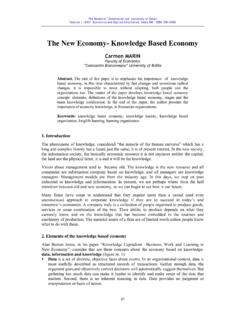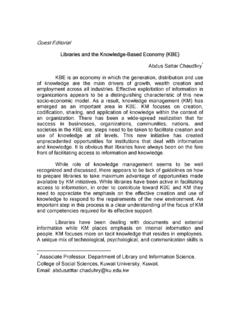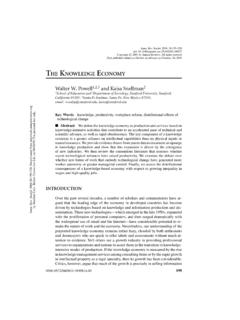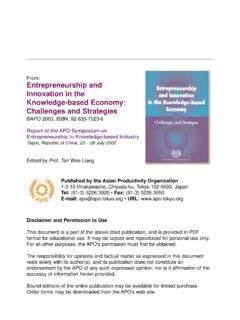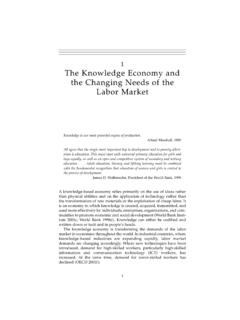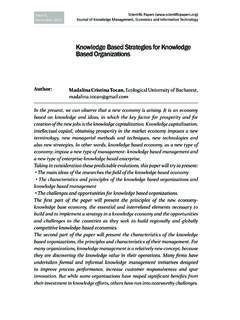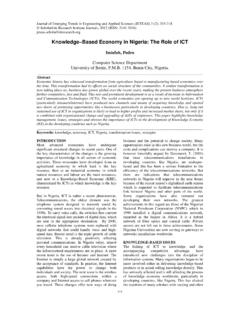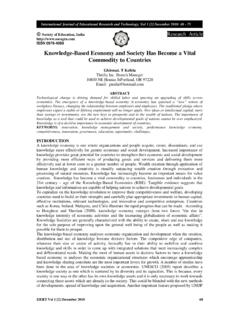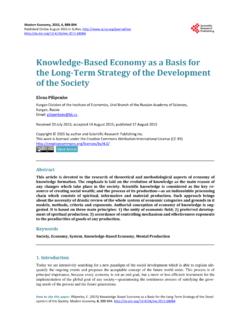Transcription of AN OVERVIEW OF THE KNOWLEDGE ECONOMY,
1 1 AN OVERVIEW OF THE KNOWLEDGE economy , WITH A FOCUS ON ARIZONA A report from the Productivity and Prosperity Project (P3), an initiative supported by the Office of the University Economist August 2011 Timothy Hogan, Professor Emerit us, Department of Economics, and Research Associate, Center for Competitiveness and Prosperity Research Center for Competitiveness and Prosperity Research L. William Seidman Research Institute W. P. Carey School of Business Arizona State University Box 874011 Tempe, Arizona 85287-4011 (480) 965-5362 FAX: (480) 965-5458 EMAIL: or 2 SUMMARY KNOWLEDGE economy is a term used in advanced economies to describe trends in which the creation of KNOWLEDGE and its use as an input in the production process are increasingly important factors in the pursuit of prosperity and competitiveness.
2 KNOWLEDGE is now recognized as the driver of productivity gains and economic growth, leading to a new focus on the role of information, technology and learning in economic performance. The broadest definition of the KNOWLEDGE economy is one in which the production, distribution, and use of KNOWLEDGE plays a key role throughout the economy . Anything that increases the quantity or quality of the factors of production available to the economy or improves the technology available to the economy contributes to economic growth. Economic growth leads to increases in real income and rising living standards. KNOWLEDGE accumulation also contributes directly to enhancing living standards by providing new or improved products and services. The creation of KNOWLEDGE and the application of the accumulated stock of KNOWLEDGE have had an increasingly important contribution to the growth process.
3 O n average, nearly 70 percent of recent economic growth in the United States and other advanced economies was the result of technological change. KNOWLEDGE has three characteristics that have very important implications for the KNOWLEDGE economy : it can be used over and over without being consumed by that use, it can be used by many individuals at the same time, and it can be used in many different locations simultaneously. The economics of KNOWLEDGE are very different than for ordinary goods and services. KNOWLEDGE can produce economic value not only to its creator, but through diffusion of the KNOWLEDGE there is also the potential for it to produce economic value for many other users. Thus, the overall value of KNOWLEDGE to society increases to the extent that it is shared and used by others.
4 Because the value to society of KNOWLEDGE is often much greater than the private economic value to its creator or owner leads to another difference between KNOWLEDGE and ordinary goods and services: a wide divergence can exist between the private return on investment to create KNOWLEDGE and the return on investment from society s point of view. Under these conditions, the private sector allocates too few resources and public sector intervention is needed to fully realize the societal benefits. The information revolution and the transition to a KNOWLEDGE economy have been accompanied by increased globalization. Explicit KNOWLEDGE that which can be codified and easily shared flows more quickly and widely than ever before. Paradoxically, the key role of tacit KNOWLEDGE that which cannot be codified, requiring face-to-face contact in the innovation process leads to geographic concentration of the processes of KNOWLEDGE creation and innovation.
5 That in turn leads to clustering of KNOWLEDGE - based firms and KNOWLEDGE workers, usually in metropolitan areas. While globalization has provided opportunities for firms, the emergence of the global KNOWLEDGE economy presents real challenges to the economic leadership that the United States has enjoyed since World War II. The processes that the United States has relied upon to produce economic growth and prosperity the creation of new KNOWLEDGE and investment in human 3 capital and advanced technology will surely continue, but similar processes are occurring around the globe. Colleges and universities perform two fundamental functions in the KNOWLEDGE economy : producing human capital and creating new KNOWLEDGE . While many of the contributions colleges and universities make to the KNOWLEDGE economy are distributed widely, their educational and research activities also benefit the local region in which they are located.
6 Universities with the greatest local economic impacts are generally those with the highest quality research programs. KNOWLEDGE - based firms want to locate near universities to tap into faculty who are on the leading edge of scientific breakthroughs. University scientists with a national reputation also are more likely to be able to attract venture capital, management, and the technical workers necessary to start new companies. Measurements of the KNOWLEDGE economy can be made by industry or by occupation. The latter measures the KNOWLEDGE economy directly in terms of the number of KNOWLEDGE workers. This approach has the advantage over the industry- based approach in recognizing that KNOWLEDGE workers may be employed across all sectors of the economy and that not all workers in KNOWLEDGE -intensive industries are KNOWLEDGE workers.
7 based on occupation, KNOWLEDGE workers accounted for nearly 31 percent of all workers in the United States in 2010. KNOWLEDGE - based industries in the United States employed 34 percent of the total in 2009. Various studies evaluating the KNOWLEDGE economy give the United States very good but not top ratings, with the United States declining over time relative to the top-ranked economies. Looking at the individual dimensions of the KNOWLEDGE economy , the United States has its highest rankings for factors relating to research and development and innovation and its lowest rankings for education and technological readiness. Evaluations of the KNOWLEDGE economy by state indicate that Arizona is in the second tier, ranking 15th overall in one study and 20th overall on another.
8 Arizona s primary weakness is in human capital. Though economic development agencies in Arizona have pursued KNOWLEDGE -intensive industries, these efforts have met with limited success. The concentration of high-technology activities in Arizona has continued to decline, so that Arizona no longer has a high-technology presence much different than the national average. In addition, Arizona continues to have a narrow base of high-technology activities. Only two activities with substantial employment manufacturing of aerospace products and manufacturing of semiconductor and other electronic components have a much greater relative presence in Arizona than the national average. As a result, per capita income levels in Arizona have fallen to far below the national average and also below the levels in most of its competitor states.
9 The creation, distribution, and application of KNOWLEDGE the bases of the KNOWLEDGE economy have been the most important factors driving the dramatic rise in living standards in the United States. Barring unforeseen game-changing phenomena, the KNOWLEDGE economy will continue to be the key driver of economic growth and prosperity in the future. Fundamental changes in the Arizona economy appear to be needed if the state is to fully participate in the global KNOWLEDGE economy of the 21st century. 4 INTRODUCTION The KNOWLEDGE economy is a term used in advanced economies to describe trends in which the creation of KNOWLEDGE and its use as an input in the production process are increasingly important factors in the pursuit of prosperity and competitiveness.
10 KNOWLEDGE is now recognized as the driver of productivity gains and economic growth, leading to a new focus on the role of information, technology and learning in economic performance. The purpose of this paper is to provide an OVERVIEW of the KNOWLEDGE economy and discuss Arizona s place in the national and global KNOWLEDGE economies. The content of the report is organized into the following seven sections: Definition of t he KNOWLEDGE economy . The importance of KNOWLEDGE creation for economic growth and prosperity. Characteristics of KNOWLEDGE and other factors that contribute to the crucial role that the KNOWLEDGE economy plays in today s world. The key role of colleges and universities in the KNOWLEDGE economy . Benchmarking America s performance in the global KNOWLEDGE economy .


